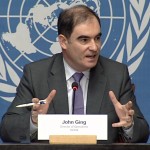
United Nations’ director of humanitarian operations has recently returned from Somalia where, he says, more than 850,000 people are in desperate need of food and “in crisis and emergency conditions.”
Adding that a further two million Somalis are “food insecure”, John Ging told a new conference, “[The figures] tell us a simple message which is that the situation in Somalia for Somalis on the humanitarian side is very grave. It’s also very fragile.’’
Ging said the UN World Food Program’s Food Security and Nutrition Analysis Unit reported this month that 857,000 Somalis are in acute crisis conditions and require urgent humanitarian assistance. This is ‘‘a modest improvement’’ from the previous six months when 870,000 Somalis desperately needed food, he said.
Somalia has long been a rudderless nation plagued by cyclical drought and famine and decades of armed conflict. Its population is estimated to be about 10 million.
In recent years it has made some strides in security and governance, particularly since August 2011, when al-Shabab militants were forced out of the capital, Mogadishu. But the al-Qaida linked rebels have not been defeated and the government controls only small parts of the country and is struggling to provide security and battle corruption.
The food security unit said about 75 percent of the 857,000 Somalis who urgently need food are displaced from their homes, largely as a result of fighting, insecurity and lack of food. Ging said others are in rural areas that are very hard to access.
“In 2011, we had a global tragedy where 260,000 people died of famine in Somalia,” Ging said, adding, “We are working very hard to help the people recover in circumstances which are extremely difficult — the climate is very harsh and the security situation equally so.”
The United Nations appealed for $933 million for the humanitarian crisis in Somalia this year, but Ging says so far it has received only $36 million which, he says, is “very ominous.” In 2011, the UN appeal for Somalia was 86 percent funded, but in 2013 it was just 50 percent funded, he said.
“Somalis have suffered endlessly for almost 25 years. We cannot be distracted now from our task to stay with them, to help to consolidate these fragile gains … and this requires funding,” Ging said. “We need to keep our attention on Somalia. It’s incredibly fragile and we don’t want a repeat of what happened in 2011.”









